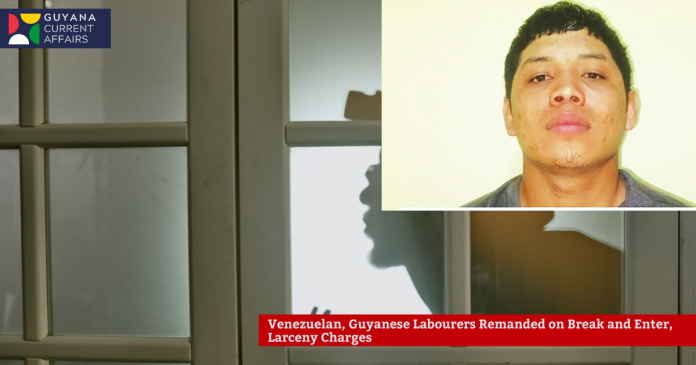Two labourers-one Venezuelan, one Guyanese-were remanded to prison this week after appearing before the Suddie Magistrate’s Court on separate charges of break and enter and larceny, highlighting ongoing concerns about property crime and migrant involvement in criminal activity along Guyana’s Essequibo Coast.
The Cases
Alejandro Aberia, an 18-year-old Venezuelan national residing at Windsor Castle, was charged with break and enter and larceny following an alleged burglary at the home of Dharshini Sookhoo. According to police, Aberia is accused of unlawfully entering Sookhoo’s residence and stealing valuables during the night. He was brought before Magistrate Tameika Clarke, where the indictable charge was read. Prosecutors objected to bail, citing Aberia’s foreign status and flight risk, and the magistrate ordered him remanded to prison. The matter was adjourned to May 6 for further report.
In a separate incident, Michael Stepney, a 57-year-old Guyanese labourer from Reliance, Essequibo Coast, was charged with simple larceny. Stepney allegedly stole items from Surujlall Deowattie, also known as “Lalloo,” at Tipsy Bar in Land of Plenty. His charge, initially indictable, was re-read under the Administration of Justice Act, allowing him to plead not guilty. Despite his plea, bail was denied, and he was also remanded to prison. Stepney’s case was adjourned to May 14, 2025, for disclosure of statements.
Broader Context
These cases come at a time when Guyana is experiencing increased migration from Venezuela due to ongoing economic and political turmoil in the neighboring country. The influx of migrants has brought both humanitarian challenges and concerns about cross-border crime, with authorities closely monitoring incidents involving non-nationals.
Guyana’s legal system, governed by the Civil Procedure Rules of 2016 and the Summary Jurisdiction (Offences) Act, allows for strict bail considerations, especially when dealing with foreign nationals or repeat offenders. The judiciary has emphasized the importance of upholding the rule of law and ensuring that all accused, regardless of nationality, receive fair and timely hearings.
Community and Legal Response
Local residents have expressed mixed feelings-some calling for compassion towards migrants facing hardship, others urging stricter enforcement to deter property crime. Law enforcement officials have reiterated their commitment to protecting property rights and maintaining public order, while also working with social agencies to address the root causes of crime in vulnerable communities.
As both cases proceed, they underscore the complex interplay of migration, economic hardship, and criminal justice in Guyana’s rapidly changing social landscape. The outcomes will be closely watched as indicators of how the country balances justice, security, and humanitarian concerns.


